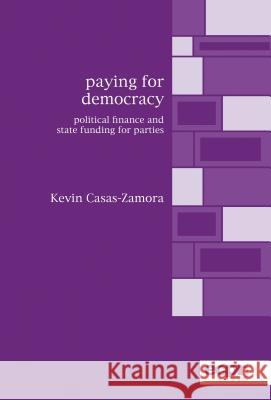Paying for Democracy: Political Finance and State Funding for Parties » książka
Paying for Democracy: Political Finance and State Funding for Parties
ISBN-13: 9780954796631 / Angielski / Miękka / 2005 / 306 str.
If the funding of parties and campaigns is a crucial issue for democratic theory and practice, then the spread of State subsidies for parties is, arguably, the most important trend in contemporary political finance. Using a large data set on political financing in more than 40 democracies, the book offers an unprecedented comparative study of the features of party subsidies and their effects on campaign finance practices, party systems and party organisations. The book also provides a detailed empirical account of campaign finance in two of Latin America's most consolidated democracies. Drawing upon extensive archival work and interviews, this work sheds light on largely hidden aspects of politics in the developing world and questions widespread beliefs about political finance, such as the rapid increase of campaign costs and the crucial role of television in this trend.
If the funding of parties and campaigns is a crucial issue for democratic theory and practice, then the spread of state subsidies for parties is, arguably, the most important trend in contemporary political finance. Using a large data set on political financing in more than forty democracies, this book offers an unprecedented comparative study of the features of party subsidies and their effects on campaign finance practices, party systems and party organisations. It also provides a detailed empirical account of campaign finance in two of Latin Americas most consolidated democracies.Drawing upon extensive archival work and interviews, Casas-Zamora sheds light on largely hidden aspects of politics in the developing world, and questions widespread beliefs about political finance, such as the rapid increase of campaign costs and the crucial role of television in this trend.Kevin Casas-Zamora is Associate Professor of State Theory at the University of Costa Rica and an international consultant on political finance issues. He currently coordinates the United Nations Development Programs National Human Development Report for Costa Rica. He holds a law degree from the University of Costa Rica, an MA in Latin American Government and Politics from the University of Essex and a DPhil in Politics from St Antonys College, Oxford. His doctoral dissertation at Oxford won the ECPR PhD Thesis Prize in 2004. He has written extensively on political finance, elections, democratisation and civil-military relations in Latin America.











